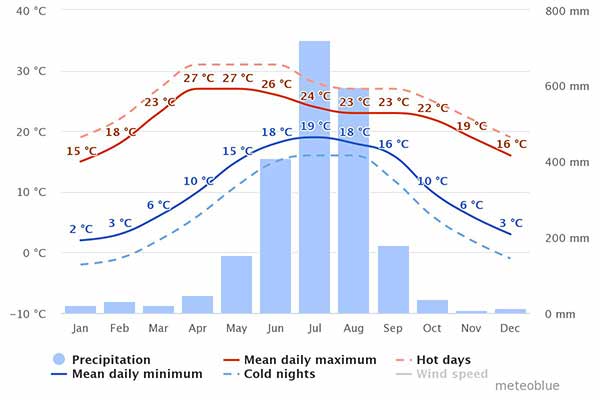This website uses cookies so that we can provide you with the best user experience possible. Cookie information is stored in your browser and performs functions such as recognising you when you return to our website and helping our team to understand which sections of the website you find most interesting and useful.

The Weather in Nepal
The weather in Nepal is very dependent on the region you are in, although generally the tourist destinations of Kathmandu, Pokhara and Chitwan National Park remain hot throughout the year with temperatures ranging from 15 degrees Celsius up to 35 degrees. Monsoon season hits from June to August, making it generally too wet for any trekking. After the rain has calmed, September to November welcomes lush vegetation and clean air, providing wonderful mountain views. This also kickstarts the hiking season, which runs until May. December and February welcome cooler temperatures, however, lower regions such as Kathmandu normally remain in the low to mid twenties (degrees celsius) and travellers are rewarded with clear skies. Temperatures in Kathmandu are starting to climb from 23 degrees Celsius in March to 29 degrees Celsius in May.
Religion is an important part of everyday life in Nepal. When visiting religious sites make sure you behave respectfully. Take off your shoes before entering Hindu temples and Buddhist sites are usually walked in a clockwise direction.
Best time to visit Nepal
The best time to visit Nepal is from October through to December, straight after the monsoon season when you’re greeted with clear blue skies, little rain and lush green vegetation. March through to May are also popular times to travel to Nepal, when the region transforms into a dazzling spectacle of colorful blossoms. The weather is still calm before the monsoon season reaches the country in June and temperatures are reaching a comfortable level in the mid twenties after the cold winter months.
However, unless you want to trek to Mount Everest, Nepal is actually an all year-round destination and there are many perks to travelling outside the peak season. October is easily the busiest time in Nepal and the Annapurna foothills are overrun with travellers. If you don’t like crowds and are after a more authentic experience then you might want to avoid peak season.
Temperatures are milder in January and February and you’re likely to catch days around the comfortable 20 degrees Celsius in Kathmandu this time of year and yet won’t find many tourists in Nepal then. If you don’t mind packing warmer clothes for chilly nights then January and February can be a very rewarding time to visit Nepal for travellers who like to explore without throngs of tourists and the pressing midday heat.

Festivals and Public Holidays
Dashain
September/October
Dashain is probably the biggest and most popular festival that is celebrated in Nepal. The date varies every year but it’s usually celebrated in late September or October and lasts for a fun-filled 15 days. The festival has its roots in Hindu religion and celebrates the victory of Goddess Durga over the evil Mahishasura. Get ready for a real cultural experience and exciting activities such as Kite flying when you visit Nepal this time of year.
Tihar (Diwali)
October/November
Tihar, also known as Diwali or The Festival of Lights, is celebrated for 5 days in October or November. Locals decorate their homes and temples and you’ll be rewarded with a sea of candles and colourful lanterns. It may be the most beautiful time to visit Nepal.
Navavarsha (Nepali New Year)
April
Pchum Ben is the most culturally significant event in the country, taking place in September of each year. People come together to bless the souls of ancestors and relatives and friends who have passed away, with Buddhist temples being the focal point of the festival. It is also known as “Ancestors Day”.
Teej
August or September ()
Teej is an important festival in Nepal and is usually celebrated in August or September for three days. Women come together in majestic red saris and sing songs of prayer and womanhood, dance and enjoy food. That’s right, it’s a womens-only festival where gods and womanhood is celebrated. If you’d like to join the party, bear in mind that although a big focus of the festival is food, women fast on the second day.
Fagun Purnima (Holi)
February/March
Fagun Purnima, or Holi, is a well-known festival that is now celebrated all over the world. During the festival people gather to throw brightly coloured powder at each other to honour Lord Krishna, a reincarnation of Lord Vishnu. You’ll also find locals lighting bonfires during the festival. This is to celebrate the death of a demon who tried to defeat Lord Krishna.
Buddha Jayanti
May/June
Buddha Jayanti is usually celebrated in May or June by Hindus and Buddhists and honors the birth of Lord Buddha. Major religious sites are decorated and monks gather to pray. If you want an authentic experience, travel to Lumbini during the celebrations. It’s said to be the birthplace of the Gautama Buddha.
Lhosar (Tibetan New Year)
December/January/February
Lhosar is the Tibetan New Year and is celebrated on different days by different communities. The three different Lhosars are usually celebrated in December, January and February. During the festival, friends and families come together to sing, cook, dance, decorate, pray and even exchange gifts. You’ll also find communities wearing traditional clothing and visiting religious sites.
Other public holidays to be aware of when planning your trip to Nepal
January
Maghe Sankranti
February/March
Maha Shivaratri
August
Janai Purnima
August/September
Gai Jatra
August/September
Indra Jatra
August/September
Krishna Janmastami
20th September
Constitution Day
25th December
Christmas Day
We are passionate adventure travelers who want to share the world and our travel experiences with everyone…
